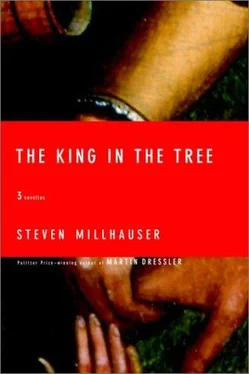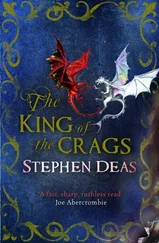Is it possible that something has changed between them?
Stranger and stranger. A week has passed, and the Queen and Tristan continue to behave with a circumspection so complete that it becomes difficult to think of them as lovers at all. He is gentle toward the Queen, listens with interest to all that she says to him, smiles mildly, is perhaps a little pensive. At supper he speaks vigorously with the King, throws back his head in laughter. Has their ardor cooled? Did they enjoy each other so ferociously in the Forest de la Roche Sauvage that they are now content to be only amicable? Is it possible that they were never what they seemed to be, that the rumors have been false from the beginning?
Even the King is aware of the change that has come over them. He studies their faces, unable to surprise a surreptitious glance, a revelatory pallor. They are gentle and innocent as children. Sometimes Tristan goes hawking with the King, while the Queen plays the harp or embroiders among her companions in the women’s quarters.
The King, who was unable to bear the ardent looks of the lovers, is made uneasy by this new decorum.
At night the King makes love to the Queen in the royal bedchamber. No longer do I hear the sound of the creaking oak door, or the pad of footsteps stealing from Tristan’s chamber.
A great peace has come over the castle.
I have it! I have it! A small incident occurred this morning, which revealed to me, in one of those sudden bursts of understanding — sharp as a smell — swift as a sword thrust— precise as a scarlet oriflamme against an azure sky — but whence these rhapsodic flourishes, highly unpleasing in an old knight scarred in battle? Calmly, Thomas.
It happened late this afternoon at supper, directly after grace. The King had returned from his hunt somewhat earlier than usual, and sat in his carved chair at the head of the table, with the Queen at his left side and Tristan at his right. Suddenly he reached out both arms and seized the Queen’s hand and Tristan’s hand, looking at each of them in turn with a gaze of ardent affection. He released their hands and turned his attention to the pantler, who was approaching with a platter of bread and butter. At that moment the Queen and Tristan exchanged a look so rapid that it was less a look than the failure of a look, less a look than a pause in a gaze directed elsewhere — but in that flicker of a glance, in that shadow of a pause, I understood, in a flash of feeling that made my skin warm, the history of their enigmatic behavior. I saw in that glance a satisfaction, as if they were acknowledging the successful operation of a plan — a plan that was luminously clear to me. They had agreed, in the strength of their rapturous love, to abstain for a while from amorous dallying, out of pity for the King. It was as if they were so sure of themselves, after the Forest de la Roche Sauvage, that they could bear to be obedient.
Does the King understand they are being kind to him? Is this the source of his uneasiness?
The King cannot conceal his discontent. It is possible of course that he imagines a trick of some kind, as if the resourceful lovers were deceiving him in a new way. Or does he sense the terrible strength of a love that permits itself such denials?
In the morning, after chapel, the King and I took a walk in the courtyard. We stopped at the mews, to see a new gyrfalcon from Norway that is said to be faster than any of our hawks. Inside we found Tristan, standing in the dusky light with a hooded merlin on his wrist. The King and Tristan spoke for a few moments about the new gyrfalcon, which the falconer was training in the field beside the orchard. The King then urged Tristan to visit the Queen, who was with her companions in the women’s quarters. Tristan hesitated and said he had promised to be present at the training of the new gyrfalcon, after which, if the King desired it, he would visit the Queen. The King strongly repeated his request. Tristan placed his bird on a perch, bowed his head lightly, and set off slowly for the women’s quarters.
Does the King fear their abstinence, suspecting it to be the sign of a love higher than his own? Or is it that, although he cannot bear to be betrayed, he can bear even less the shame of being spared?
The King’s bizarre behavior continues. Does he wish to hurl Tristan into the arms of the Queen?
Tonight as I lay in bed I heard the sound of the bar sliding back in the door of the royal bedchamber. Footsteps— unmistakably the King’s — moved directly to Tristan’s chamber. A knock, a sliding bar, low voices. Two sets of footsteps— the King’s and Tristan’s — departed from his room and entered the royal chamber. What could it mean?
I must have drifted into sleep, for when I woke I saw the light of a candle flickering on the ceiling above my drawn bed curtains. Suddenly the curtains rattled open and I saw the King’s face, bending toward me. His eyes were excited and impatient. I swung my legs over the side of the bed, threw a mantle over my nakedness, and followed the King into the royal bedchamber.
In the dark, lit only by the candle, I saw Tristan lying on his back on the floor. One arm was flung out; his eyes were closed. I turned in alarm to the King, who stood over the immobile body of his nephew as if in a trance; by the light of the candle I bent over fearfully for a closer look. Tristan’s eyes opened. He looked at me without surprise, smiled frankly, then sprang up, with the swift grace that has always been his, and stood before the King.
Tristan spoke in a whisper. “The Queen is sleeping soundly, my lord.”
The King appeared to be waking from a dream. He turned his face toward me, while continuing to gaze at Tristan, and said in a low voice, “The Queen was having nightmares. I thought perhaps Tristan—”
Seated now at my table, I write these lines hastily. How much longer can these disturbances continue? Disorder in the bedchamber, division in the castle, unease in the kingdom. I fear for the King, fear for Tristan. They are playing a dangerous game that cannot end well. The King, feigning concern for his wife, invites Tristan into the royal bed; Tristan lies chastely on the floor. Move and countermove, trap and escape. Where will it end? Must sleep now.
I ask myself: why did the Queen and Tristan return to the castle? Is it that their idyll in the forest was born in secrecy and could not survive secrecy’s end? But surely they might have fled to another forest, in another kingdom. You forget, Thomas, that the King summoned them. Why then did they obey? Can it be that, even as they betray the King, they remain loyal subjects whose deepest impulse is obedience?
Another explanation presents itself. The love of Tristan and the Queen has always flowed around and against the King. Banished from the court, alone in the forest, did they find themselves sometimes thinking of him? Were they growing a little restless, there in the forest? In order for their love to flourish — in order for them to love at all — do they perhaps need the King?
A brilliant stroke! The King has summoned the Queen and Tristan before his Council, and in the presence of his leading barons has praised them for putting slander to rest by their exemplary behavior. Since their return to court, he said, they have in all things been obedient to the royal will, and anyone guilty of words touching upon the honor of his house will be punished swiftly.
By this speech the King has accomplished two things. He has transformed the lovers’ freely chosen abstinence, which galls him and provokes him at every instant, into an act of obedience to the royal will. But hidden within his praise is a second, darker, and more brilliant stratagem.
The King divines, with the keenness of a sharpened jealousy, that the Queen and Tristan are not obedient — that although they play the game of renunciation, at the hidden center of their renunciation is the opposite of self-denial: an utter abandonment of themselves to each other. For if, in the fullness of their triumphant love, they delude themselves into a concern for the King’s well-being, if they take pleasure in obedience, if they savor the delights of renunciation, in truth they renounce nothing, they obey no one, they are bound to each other above all earthly and heavenly things. And because the King divines this, which they themselves have not yet divined, swept up as they are in their little drama of renunciation, the King has seized an advantage in the dangerous game all three are playing.
Читать дальше












